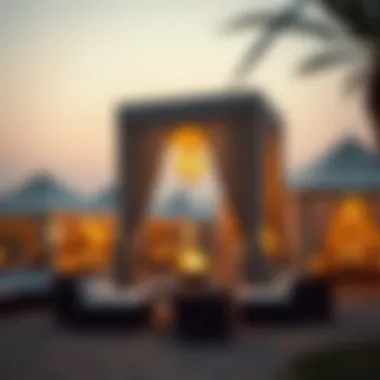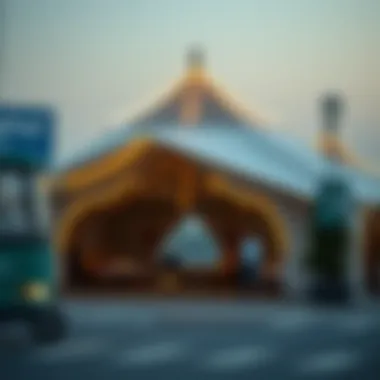Exploring Iftar Tents in Dubai: A Cultural Delight


Intro
As the sun sets during the holy month of Ramadan, the city of Dubai transforms into a hub of vibrant celebrations, the focal point of which are the beautiful Iftar tents. These temporary structures offer not just a meal but a feast for the senses, where the aromas of traditional cuisine mingle with laughter and the warmth of community. Understanding this unique aspect of Dubai's culture is essential for anyone wishing to experience the city fully during Ramadan.
Iftar tents are more than just dining spots; they are cultural landmarks, where the lineage of customs and family traditions converge. Within the bustling urban landscape, these tents provide a haven of serenity and reflection, enabling both locals and visitors to break their fast with a sense of belonging.
In this comprehensive guide, we’ll take an immersive dive into the Iftar tents scattered across the city. From examining their cultural significance to offering practical tips on which tents to visit, this article aims to equip you with all the insights you need. Let’s get ready to explore what makes these gatherings an indispensable part of the Dubai Ramadan experience.
Understanding Iftar Tents
Iftar tents play an integral role during Ramadan in Dubai, providing a space for reflection, celebration, and community. It's not just about breaking fast; it encapsulates the essence of togetherness that Ramadan promotes. This section delves into the definition and cultural significance of Iftar tents, offering insights that resonate with the spirituality surrounding this holy month.
Definition and Purpose
Iftar tents are temporary structures set up during Ramadan designed to host the evening meal that breaks the daily fast. They serve a practical function by providing a communal space where individuals can gather to share food after sunset, which happens at different times throughout the month. The meals typically begin with dates and water, following the tradition of the Prophet Muhammad.
The purpose of these tents extends beyond mere sustenance; they foster community spirit and provide an opportunity for social interactions. From luxury setups with luxurious decor to simple communal areas, these tents cater to diverse needs, allowing individuals and families, as well as tourists, to indulge in the authenticity of this cultural experience.
Many hotels, restaurants, and community organizations host these tents, and they range from opulent to modest in style—yet each one embodies the spirit of Ramadan by promoting charity, hospitality, and inclusion.
Cultural Significance
Iftar tents are not just venues for dining; they are symbols of the rich cultural tapestry that is woven from diverse traditions and practices during Ramadan. In the UAE, the essence of sharing and generosity is amplified through these communal gatherings, emphasizing the values of compassion and unity.
“The spirit of Ramadan is best captured in the act of sharing a meal with others.”
The gatherings often draw together people from various backgrounds, fostering a sense of belonging. For expatriates and locals alike, the Iftar tents provide a unique opportunity to engage in intercultural exchange, often leading to lasting friendships.
Additionally, many organizations utilize these tents to give back to communities by offering free meals to those in need, showcasing the deeper values of charity (Zakat) and social responsibility during this sacred month.
In essence, Iftar tents are vital in preserving traditions and reinforcing social ties, making the experience of breaking fast not just a personal ritual but a collective celebration of faith and community.
Historical Context of Iftar Tents
Understanding the historical context of Iftar tents provides a deeper appreciation of these vibrant setups in Dubai. Rooted in the traditions of Ramadan, these tents are much more than temporary dining establishments; they reflect the evolution of cultural practices and community spirit over the years. The rich history behind these tents illustrates how they have become integral to Iftar celebrations, serving as spaces not only for dining but also for cultural exchange and social bonding.
Origins in Ramadan
The origins of Iftar tents trace back to the early days of Islam when the tradition of breaking the fast during Ramadan began. Historically, Iftar was a modest meal shared mostly among family and close friends, often enjoyed at home. However, as cities grew and communities diversified, the need arose for more communal spaces where people could come together and celebrate this sacred time of reflection and gratitude.
In Dubai, the first Iftar tents began to appear about three decades ago. They were initially simple structures, offering basic meals to the public. Such tents were set up in public parks and courtyards, creating an opportunity for neighbors and families to gather. This shift toward communal dining not only helped to strengthen bonds among residents but also highlighted the spirit of generosity synonymous with Ramadan.
Evolution Over the Years
Over the years, Iftar tents have seen remarkable transformations, evolving from basic setups to extravagant venues. The development of these tents reflects broader trends in Dubai's rapid urbanization and economic growth.
- Influence of Hospitality Industry: With Dubai becoming a global hub for tourism and luxury, many five-star hotels and restaurants began to host Iftar tents featuring lavish spreads that showcase a blend of traditional and international cuisines. This shift allowed the broader community to experience the essence of Ramadan while indulging in culinary diversity.
- Design and Themes: The design of Iftar tents has also evolved. Today, they boast elaborate interiors and themes, ranging from traditional Arabian decor to modern aesthetics. Many establishments curate unique atmospheres, incorporating elements such as ornate fabrics, ambient lighting, and cultural motifs, providing guests with an immersive experience.
- Community Engagement: In more recent years, there’s been a significant focus on sustainability and inclusivity. Businesses are increasingly engaging with local charities, providing meals for those in need. This social responsibility reflects the core values of Ramadan—sharing and caring for one another within the community.
"Iftar tents are not just about food; they symbolize unity and the essence of togetherness during Ramadan."
As these historical elements come together, they illustrate how Iftar tents in Dubai have not merely adapted but thrived, representing a fusion of cultural heritage and modernity. Understanding their evolution allows us to appreciate not just the meal, but the collective memories forged over shared dinners in the soft glow of the desert evening.
Where to Find Iftar Tents Near You


Finding the right Iftar tent can greatly enhance your Ramadan experience in Dubai. These vibrant spaces not only offer meals but also encapsulate the spirit of communal dining, embracing both tradition and modernity. Understanding where to locate these tents can save time and ensure you enjoy authentic dishes that your taste buds will remember well past the holiday.
Dubai boasts a variety of locations tailored to diverse preferences and budgets. Whether you are looking for high-end dining options or simply want to immerse yourself in local culture, knowing where to find Iftar tents ensures that your evening meals during Ramadan are both enjoyable and meaningful. This section will spotlight popular establishments as well as hidden gems to ensure a rich experience while breaking fast.
Types of Iftar Tents
Understanding the variety of Iftar tents available is essential for a rewarding experience during Ramadan in Dubai. These spaces cater to different tastes, preferences, and budgets, allowing everyone to partake in the festive spirit. From luxurious setups fit for royalty to community tents that foster togetherness, each type plays a crucial role in making Iftar more meaningful. Below, we will explore the key types of Iftar tents you might encounter.
Luxury Tent Options
Luxury Iftar tents offer an extravagant twist to the classic Iftar experience. Designed to impress, these tents often feature plush furnishings, high-end décor, and exceptional service. Patrons can expect amenities like private seating arrangements and even live cooking stations that showcase traditional dishes.
One prime example is the Al Maha Desert Resort and Spa tent, where the atmosphere mimics the enchanting surroundings of the desert. Guests are treated to a gourmet dining experience with a blend of local and international fare. Benefits include:
- Elegant Environment: The lavish interior and beautiful landscapes provide perfect Instagram opportunities.
- Exceptional Service: Staff are trained to cater to your every need, ensuring a relaxed and enjoyable dining experience.
- Unique Offerings: Rather than just standard fare, luxury tents might include specialty dishes prepared by renowned chefs.
Community and Public Tents
Community and public tents are truly the heart of Ramadan gatherings. These Iftar tents are often set up in common areas, parks, or town squares, making them widely accessible. They attract a diverse mix of individuals and families, creating an inviting atmosphere where everyone is welcome to break bread together.
A notable place where you can find public Iftar tents is at Zabeel Park. These tents focus on promoting inclusivity and community spirit, emphasizing the importance of sharing. Key features of community tents include:
- Affordable Dining: Many community tents offer meals at little to no cost, ensuring everyone can participate regardless of financial means.
- Cultural Exchange: This setup is conducive to meeting new people and exchanging stories, enriching one’s understanding of different cultures.
- Traditional Experiences: Often, community tents will feature traditional entertainment, such as live music or storytelling, enhancing the festive atmosphere.
Family-Friendly Spaces
Family-friendly Iftar tents cater specifically to families, offering amenities that make dining with children easier and more enjoyable. These spaces often include designated play areas, kid-friendly menus, and relaxed settings that prioritize comfort.
Examples of family-oriented Iftar tents can be found around the Dubai Marina or at hotel complexes like Atlantis The Palm. Key attributes of these spaces include:
- Kid-Friendly Options: Menus often feature simplified international and local dishes, ensuring even the pickiest eaters can enjoy their meal.
- Recreational Activities: Many family tents organize activities like face painting or crafts, allowing kids to have fun while parents enjoy their meal.
- Relaxed Atmosphere: The focus on families means that everyone can unwind in a comfortable environment, combining dining with quality family time.
Catering Options in Iftar Tents
When it comes to Iftar tents in Dubai, the culinary offerings are often the soul of the experience. Iftar isn't merely about breaking fast; it's a time to indulge in an extensive array of dishes that showcase the rich tapestry of Arabian flavors alongside a medley of international cuisine. Catering options in these tents serve a dual purpose: they quench the hunger cultivated during a day of fasting and foster community bonds among guests as they gather around shared meals.
Understanding the catering dynamics can significantly enhance your Iftar experience. Here are some factors to consider when it comes to catering options:
- Diversity of Menu: Many tents provide a well-balanced representation of both traditional and contemporary dishes, catering to a wide spectrum of tastes.
- Freshness and Quality: Since Iftar meals are prepared to please the senses, fresh ingredients are crucial. High-quality catering can elevate the overall dining experience substantially.
- Cultural Immersion: The types of food served often reflect local traditions, enhancing the experience with a sense of authenticity.
- Flexibility in Choices: From vegetarian options to more elaborate meat dishes, good catering services can accommodate various dietary needs.
Catering not only fills plates but also plays a key role in the social fabric of these gatherings, allowing families, friends, and even strangers to connect and share.
Traditional Arabian Cuisine
One of the primary attractions of Iftar tents is the delectable traditional Arabian cuisine. This cuisine has deep roots in Middle Eastern history, and the flavors often evoke nostalgia and comfort among diners. Popular dishes typically include:
- Harees: A dish made with wheat and meat, cooked slowly to a porridge-like consistency. It’s hearty and satisfying, perfect for breaking a day-long fast.
- Mandi: This fragrant dish features spiced rice with meat, traditionally lamb or chicken, all cooked together for a rich flavor.
- Dates: Traditionally, the fast is broken with dates, emblematic of Arabian hospitality. They are sweet, nutritious, and provide a quick source of energy.
Moreover, it's common to find aromatic spiced coffee (Gahwa) accompanying meals, representing the warm culture of hospitality. The experience of tasting these traditional dishes during Iftar resonates on both culinary and cultural levels, deepening the connections made during this sacred month.
International Dishes
While traditional dishes hold a significant place in Iftar tents, the infusion of international dishes adds a delightful twist to the culinary journey. Dubai’s cosmopolitan nature is well-reflected in its Iftar offerings. Food from various cultures mingles in the tents, ensuring there's something to please every palate. Among the popular choices are:
- Pasta Dishes: Creamy Alfredo or spicy Arrabbiata, catering to those looking for something familiar yet indulgent.
- Asian Stir-Fries: These offer a burst of flavors and nutrients, often featuring vegetables, meats, and savory sauces that excite the taste buds.
- Mediterranean Salads: Fresh salads, sometimes topped with grilled fish or chicken, provide a refreshing counterpoint to heavier dishes, enhancing the overall meal experience.


This blend of international cuisines allows diners to savor the flavors of the world while still immersing themselves in the rich cultural tapestry of Dubai. Whether you are an adventurous eater or someone who prefers familiar tastes, the variety available is truly remarkable.
Ultimately, the catering options in Iftar tents are designed to celebrate the spirit of Ramadan, bringing people together through the universal language of food. As you plan your Iftar experience, consider how these culinary offerings can enrich your time spent in the tent.
Atmosphere and écor
Creating the right atmosphere in Iftar tents during Ramadan is crucial. The ambiance sets the tone for the communal experience that is so inherent to Iftar, elevating the mealtime into a moment of connection and tranquility. It’s more than just a space; it’s a feeling, a mood, and a celebration of culture. Unique design elements, thoughtful decorations, and attentive details foster a sense of belonging and warmth among guests, making each gathering memorable.
Themes and Cultural Influences
Each Iftar tent often showcases specific themes that reflect cultural heritage or holiday motifs. For example, some tents may opt for a traditional Arabian theme, complete with lavish carpets and intricate lanterns, while others might embrace a more modern aesthetic, integrating contemporary art and décor influenced by international design trends.
Guests can expect:
- Colorful textiles: Vibrant drapes and cushions in rich hues often envelop guests, creating an inviting atmosphere.
- Cultural artwork: Many tents feature local artisans' work, showcasing traditional crafts that narrate stories of the Emirati heritage.
- Lighting: The soft glow from decorative lamps and fairy lights contributes to a serene ambiance, allowing for a more intimate dining experience.
This thoughtful incorporation of cultural elements does not just provide visual appeal; it reinforces the significance of shared experiences during Ramadan, enlightening guests about the rich traditions of the region.
Importance of Ambiance in Iftar
Ambiance plays a pivotal role in enhancing the overall Iftar experience. A well-crafted environment invites guests to relax and engage in meaningful conversations, encouraging a sense of unity and community among diverse individuals.
Some key points on the importance of ambiance include:
- Encouragement of Reflection: A calm, welcoming space allows for personal reflections as one breaks fast.
- Social Interaction: A well-decorated environment promotes mingling, creating a natural setting for new friendships and connections.
- Experience Elevation: Proper atmosphere amplifies the anticipation and joy of the Iftar meal, making it more exceptional than simply breaking bread.
"The decor transforms plain gatherings into extraordinary celebrations."
Investors and developers focusing on hospitality venues in Dubai should not underestimate the power of atmosphere. As visitors increasingly seek authentic experiences, the careful crafting of Iftar tent decor becomes essential in appealing to this discerning audience. Consistently reviewed and sought-after experiences are born not just from delicious food but memorable settings too.
Pricing and Reservation Details
Understanding the pricing and reservation details of Iftar tents is crucial for anyone looking to partake in this Ramadan tradition without a hitch. The experience shouldn’t just be about the food; it’s also about seamless preparation. Knowing what to expect in terms of costs can ease any worries associated with budgeting for the month. Reservation processes come into play too, especially during peak Ramadan season when demand soars.
Cost Factors to Consider
Pricing for Iftar tents can vary significantly based on a number of factors, including:
- Location: Central locations tend to command higher prices compared to tents situated on the outskirts of the city.
- Tent Size & Amenities: Larger tents or those with added amenities like air conditioning, entertainment, or special decorations may lead to increased costs. Luxury tents often provide exquisite lounges and seating arrangements, creating an opulent dining experience.
- Catering Quality: The menu and type of cuisine served also affect overall pricing. Traditional Arabian feasts might range widely based on ingredients and preparation complexity.
- Reservation Timing: Early bird reservations can sometimes bring discounts. Procrastination could mean paying a premium or missing out entirely.
- Group Sizes: Some establishments offer group packages or rates that provide a discount for larger gatherings, which can significantly help families or groups of friends.
These elements weave together a more complex narrative around how much one might expect to spend, emphasizing the necessity of planning ahead. For those wanting to genuinely enjoy the ambiance and flavors, being mindful of these factors can make a world of difference.
How to Make Reservations
Getting a reservation for an Iftar tent does not have to be a daunting process. Here’s how to streamline your experience:
- Research Online: Start with a quick online search. Websites affiliated with local tourism boards or dining platforms offer a plethora of options and reviews. Websites like Tripadvisor and Zomato can be particularly useful in finding reputable venues.
- Direct Contact: Most Iftar tents provide direct booking options via phone or email. Reaching out can allow you to ask specific questions, such as menu details or seating arrangements, which online forms may not capture adequately.
- Leverage Social Media: Many tents use platforms like Facebook or Instagram to promote their offerings. Following them can lead to special deals or reservation announcements.
- Check Local Listings: Websites or apps focused on events in Dubai often keep updated lists of Iftar tent offerings. These platforms ensure you are in tune with last-minute availability or new options that may have sprung up.
- Plan Ahead: As Ramadan progresses, tent availability can shrink quicker than a desert oasis in high heat. Making a reservation earlier not only secures your spot but may also lead to better pricing.
In summary, navigating the landscape of pricing and reservations for Iftar tents is more about being informed and strategic than it may appear at first glance. The ease of reservation underscores the importance of preparation, ensuring that one can immerse themselves in the essence of Ramadan without any stress.
Be mindful: securing your spot ahead of time is essential to avoid disappointment during peak times.
Accessibility Considerations
When organizing or planning to visit Iftar tents in Dubai, it’s crucial to take into account the various accessibility considerations that ensure everyone can enjoy the experience. Accessibility isn’t just a buzzword; it’s about creating inclusive spaces where people of all abilities can gather and partake in the rich traditions of Ramadan. By addressing specific elements and benefits related to accessibility, we can foster an environment that welcomes all, enhancing the communal spirit that Iftar embodies.


Transportation Options
Accessing Iftar tents involves navigating the bustling city of Dubai, making transportation a key factor in ensuring a seamless experience. The good news is that Dubai boasts a robust public transportation network that greatly aids in reaching these festive gatherings. Here are some transportation options to consider:
- Metro Services: The Dubai Metro is a reliable means of transport, with numerous stations located near major Iftar tent locations. Stations like Burj Khalifa/Dubai Mall and Mall of the Emirates are excellent starting points.
- Public Buses: Another affordable option is the Dubai public bus system. Buses are usually equipped with designated spaces for wheelchairs, allowing for comfortable access.
- Taxis and Ride-Sharing: Taxis are plentiful in Dubai, and services like Uber and Careem make it easy to arrange transport directly to your desired tent. Simply check for vehicles that are wheelchair accessible, if needed.
- Personal Vehicles: If driving, note the accessibility of parking spaces. Most upscale venues provide designated spots for guests with mobility challenges, which helps ease access.
In summation, the diversity of transport choices allows for a hassle-free journey to Iftar tents, making them reachable for everyone.
Facilities for Differently-Abled Guests
An inclusive Iftar experience extends beyond just transportation; it encompasses the facilities available within the tents themselves. Having appropriate amenities can greatly enhance comfort and enjoyment for guests with disabilities. Here are some essential facilities to look for:
- Wheelchair Accessibility: Ensure that the entry points and the seating areas in the Iftar tents are wheelchair-friendly. Ramps should replace stairs, and paths should be wide enough to allow smooth passage.
- Accessible Restrooms: Not only should the restrooms be conveniently located, but they also need to meet accessibility standards. Facilities should include grab bars and enough space for assistance, if required.
- Seating Arrangements: Some tents offer flexible seating options which can be adjusted according to individual needs, ensuring that everyone finds a comfortable spot to dine.
- Staff Training: It’s essential for Iftar tent staff to be trained in providing support to differently-abled guests. This includes showing empathy and understanding, as well as being able to assist when required.
"Inclusivity in hospitality ensures that the spirit of Ramadan is felt by all, fostering community and togetherness."
By concentrating on these accessibility aspects, Iftar tents can elevate the experience for everyone, promoting a sense of belonging during the sacred month of Ramadan. These considerations not only reflect the values of compassion and community but also align with Dubai’s commitment to becoming a more inclusive city.
Etiquette and Expectations
Navigating Iftar tents during Ramadan is not just about feasting on delicious food; it’s also about understanding and respecting the traditions that come with this unique dining experience. Knowing the etiquette and expectations can elevate your Iftar experience while fostering respect and harmony among diners. This section delves into the crucial elements that should be kept in mind when visiting these cultural hubs in Dubai.
Dining Etiquette in Iftar Tents
Dining etiquette during Iftar is laden with significance. It's a time of reflection and community, where breaking bread together symbolizes unity and compassion. Here are some key aspects to consider:
- Timing is Crucial: The fast is broken at sunset, so it's essential to be present a few minutes before, allowing one to engage in the communal du’a (supplication) before starting the meal. Ensure you are seated comfortably, ready to partake when the call to prayer rings out.
- Respect the Traditions: Begin your meal with three dates and a glass of water. This tradition is rooted deeply in Islamic customs and signifies the continuity of life. Adhering to this practice shows respect for cultural norms.
- Table Manners Matter: Use your right hand while eating, as it’s traditionally preferred in many cultures. This is especially important in Arab communities. It reflects honor and respect.
- Communicate: Engage in light conversation. Iftar tents are designed to foster social interaction. Participate in discussions and exchange pleasantries; it’s a wonderful opportunity to connect with individuals from diverse backgrounds.
- Leave No Trace: Remember to clear your area or dispose of your waste thoughtfully after dining. This simple act shows respect for the hosting establishment and other diners.
These etiquette elements not only enhance your personal experience but also contribute positively to the collective atmosphere at the table.
Dress Code Recommendations
When it comes to dressing for an Iftar tent, it’s important to blend comfort with cultural appropriateness. The following recommendations will help you strike that balance:
- Choose Modest Clothing: Opt for loose-fitting, modest attire. For men, long pants and shirts with sleeves are a norm. Women should consider long dresses or skirts, paired with a modest top. Covering your shoulders is respectful and aligns with the cultural expectations in the region.
- Consider the Climate: Dubai can be quite warm, so lightweight fabrics that allow the skin to breathe are preferable.
- Footwear: While sandals are generally acceptable, it’s wise to avoid overly casual footwear like flip-flops. Closed shoes tend to carry a more respectful vibe in formal settings.
- Accessorize Smartly: Minimal accessories reflect a keen sense of decorum. This isn’t the time for flashy jewelry; instead, subtle pieces can enhance your outfit.
Observing these dress code recommendations not only enhances the spiritual ambiance but also reflects respect for the hosts and fellow diners who share this significant moment.
Remember: Dressing appropriately and practicing good dining etiquette contributes to a memorable Iftar experience, forging connections that transcend cultural divides.
By embracing these practices, you acknowledge the sanctity of the occasion, ensuring that the Iftar you partake in is not just a meal, but a celebration of community and respect.
Epilogue
The exploration of Iftar tents in Dubai offers a rich tapestry of culture, community, and culinary delight during the holy month of Ramadan. These tents serve as more than just a place to break the fast; they embody the very spirit of togetherness and hospitality that are hallmarks of this sacred time.
Summarizing the Iftar Experience
The Iftar experience is a delightful convergence of flavors, traditions, and social interactions. As the sun sets, families and friends gather to enjoy a meal that marks the end of a day of fasting. The vibrant setups of the Iftar tents enhance this experience, often adorned with intricate decorations reflecting Islamic art and culture.
[block: quote
"Iftar is not just about eating; it’s an event where one reconnects with family and friends, sharing joy and gratitude amidst the festivities of Ramadan."
]
In these tents, diners can indulge in a range of delightful dishes, from traditional Arabian cuisine to a melting pot of international flavors. Diners can enjoy classic dishes like date-stuffed pastries, lentil soup, and the much-loved mashawi (grilled meats) alongside more diverse offerings that highlight the cosmopolitan nature of Dubai. This culinary diversity reflects the city's multicultural landscape, attracting not just locals but also tourists looking to embrace the Ramadan spirit.
Final Thoughts on Iftar in Dubai
As you plan your visit to these bustling tents of Iftar, consider how they provide a platform for socializing, culinary exploration, and understanding cultural nuances that are deeply rooted in the region. It’s an experience that is not only about satisfying hunger but also nourishing the spirit and fostering a sense of belonging in the vibrant tapestry that is Dubai during Ramadan.
In embracing the Iftar experience, you're not just participating in a meal; you’re engaging in a cultural exchange that enriches both locals and visitors alike, inviting everyone to partake in the authentic essence of community that defines this beautiful Emirate.
For more details, you might want to check out some resources on Ramadan traditions and local customs here to enhance your understanding of this joyous occasion.















